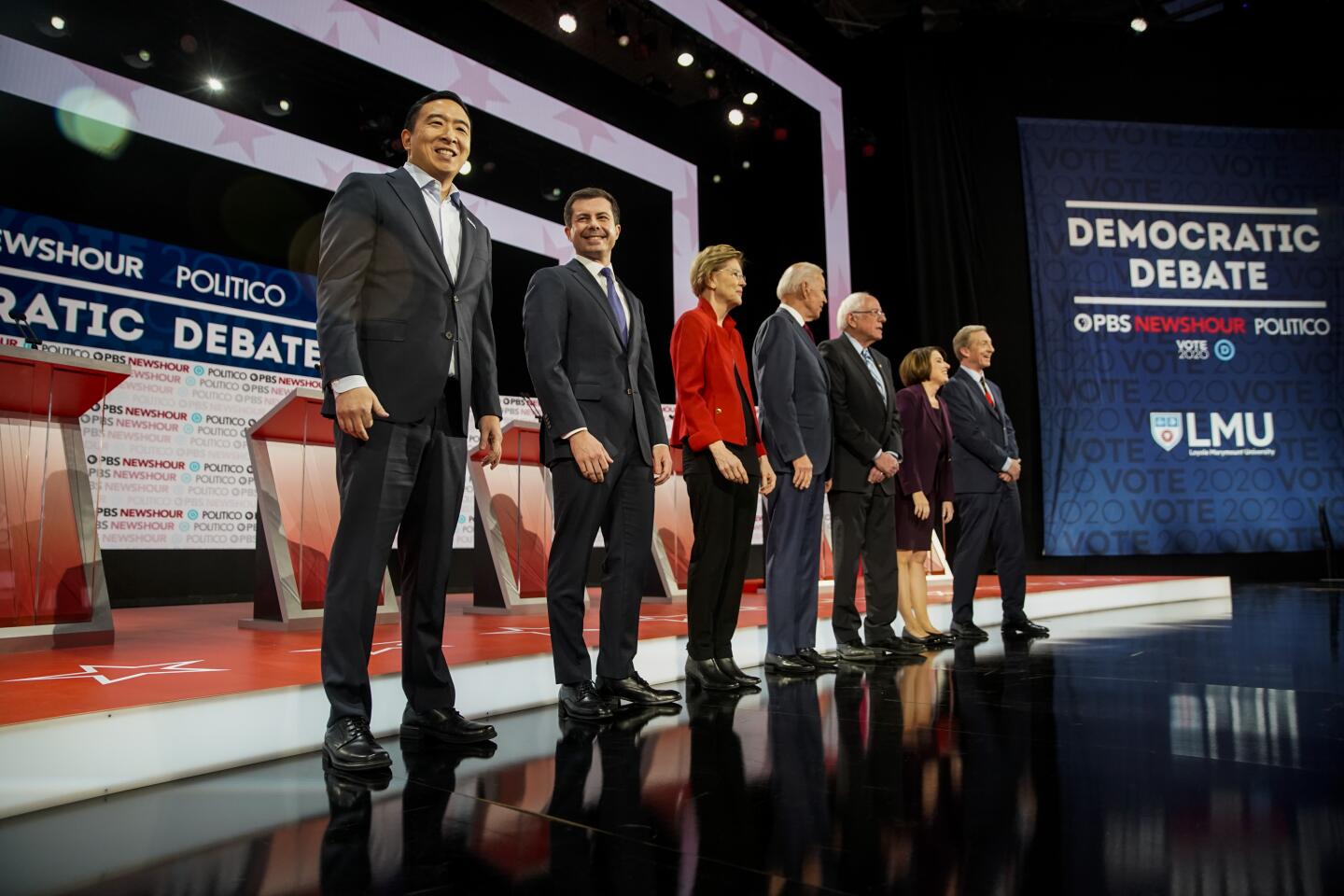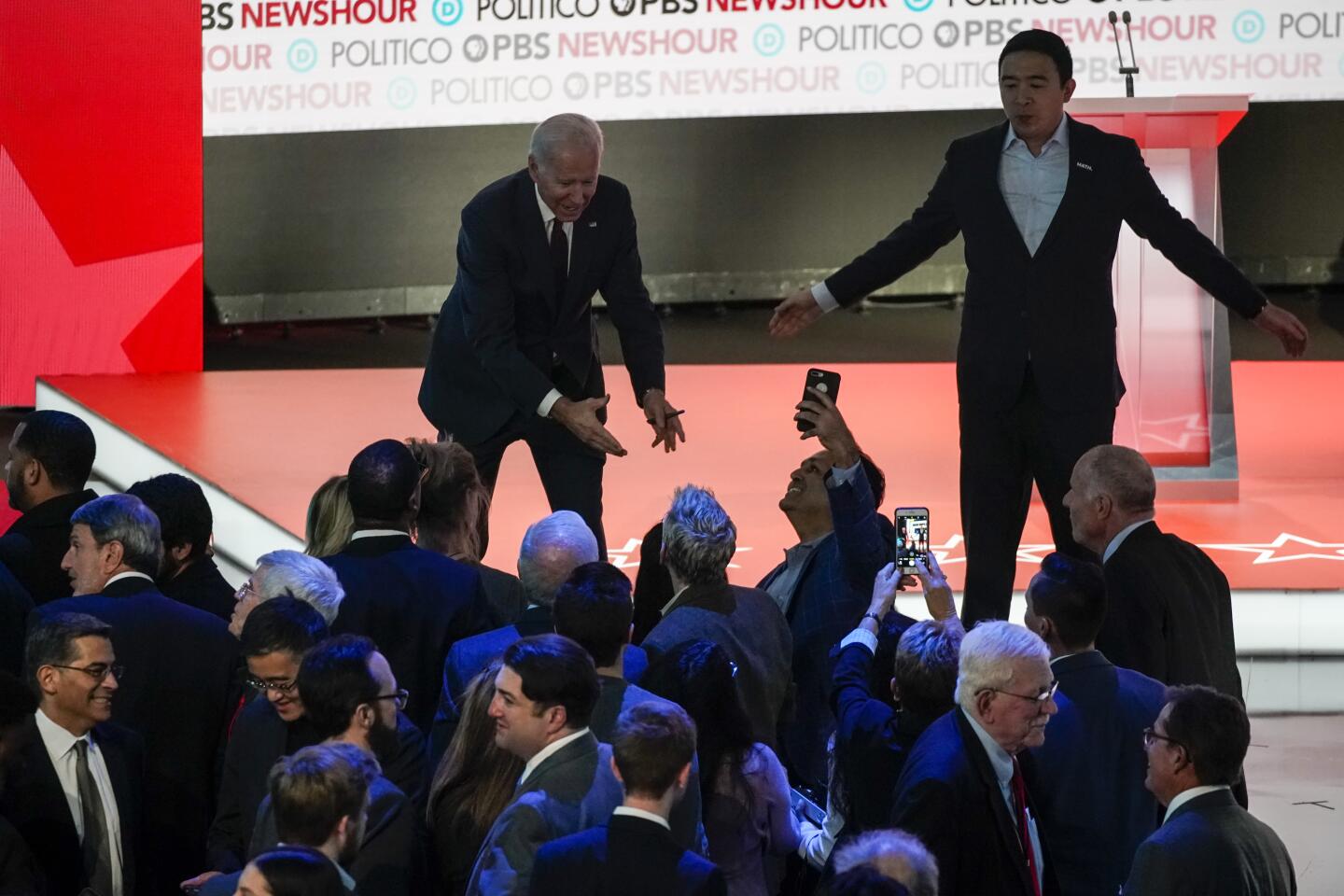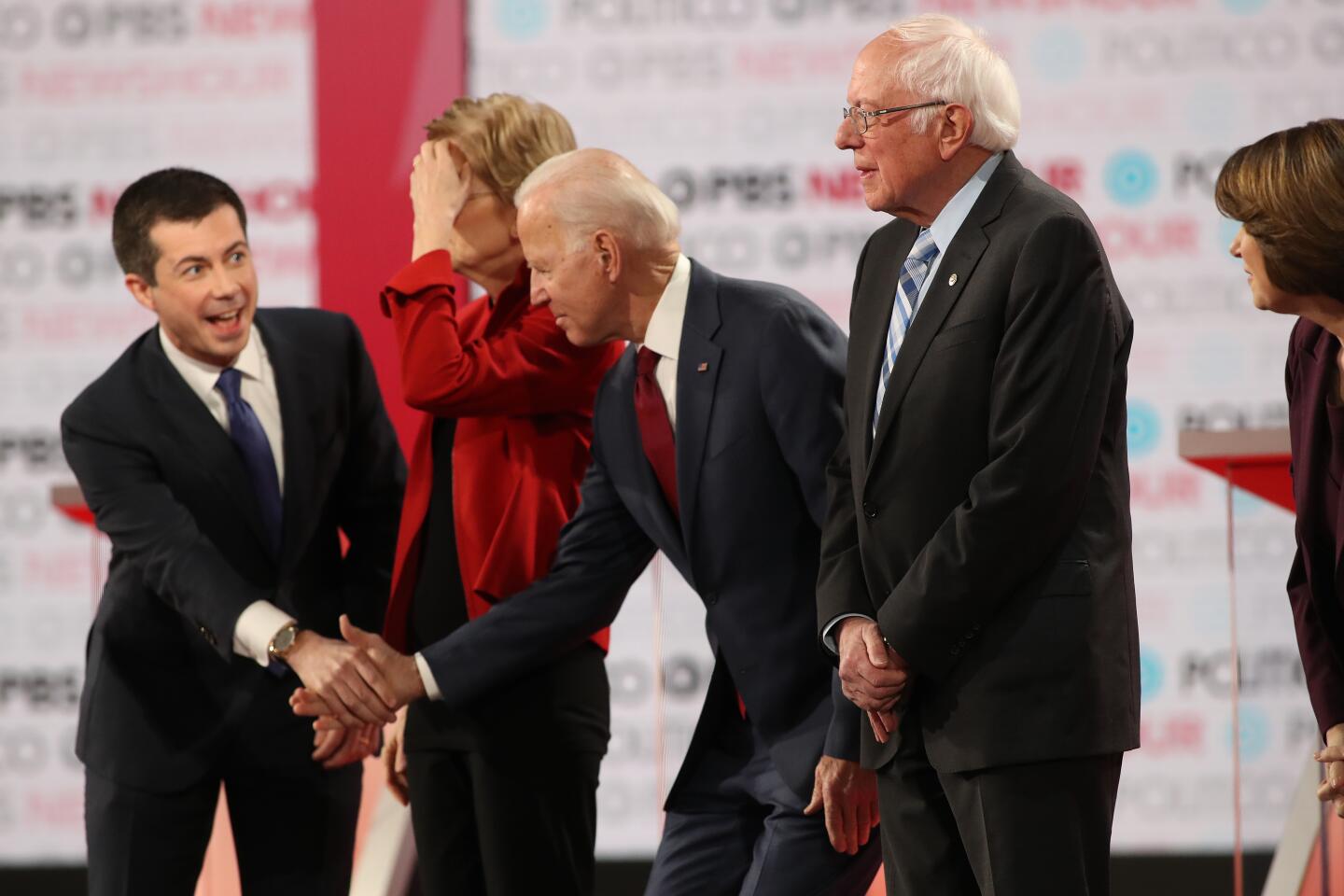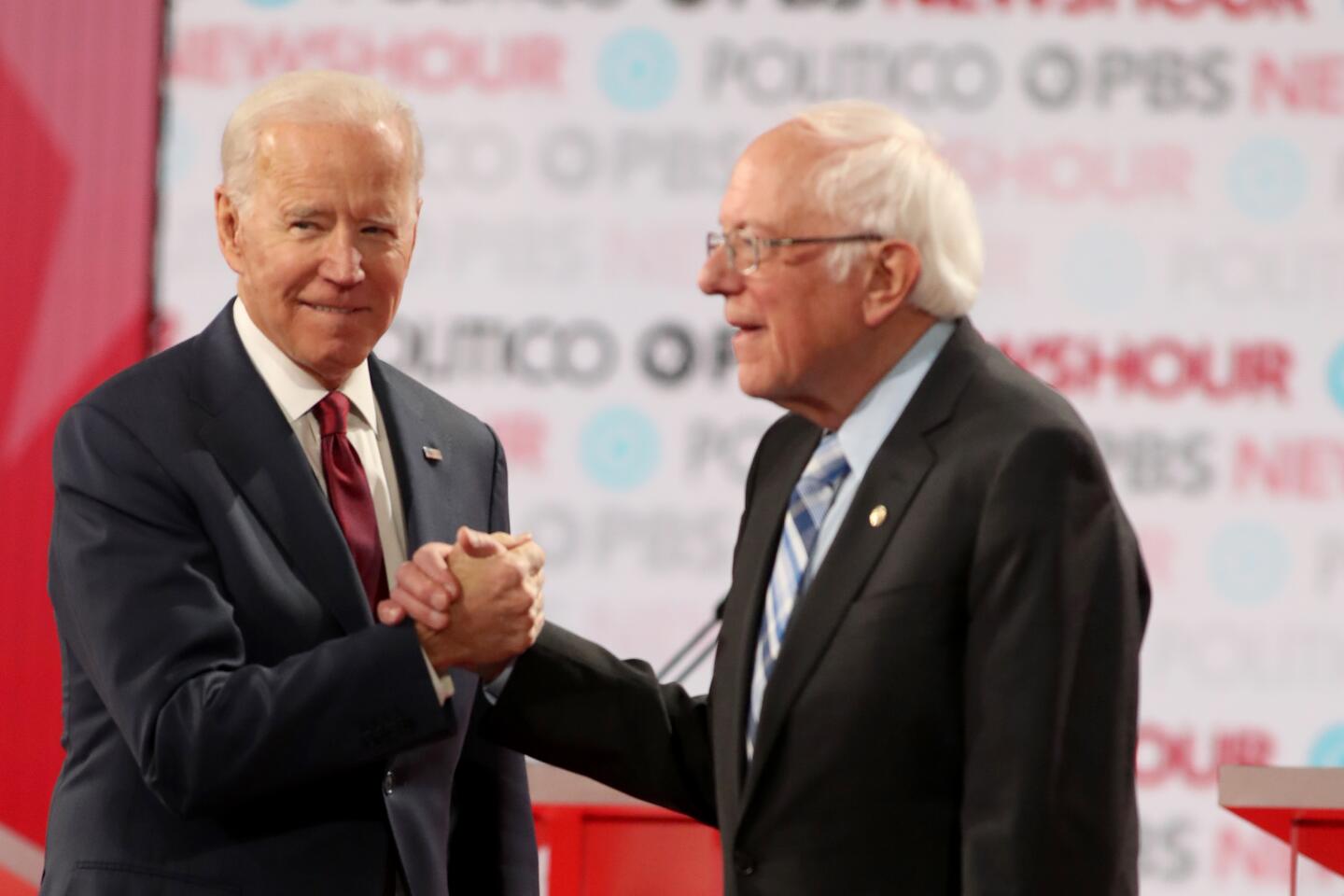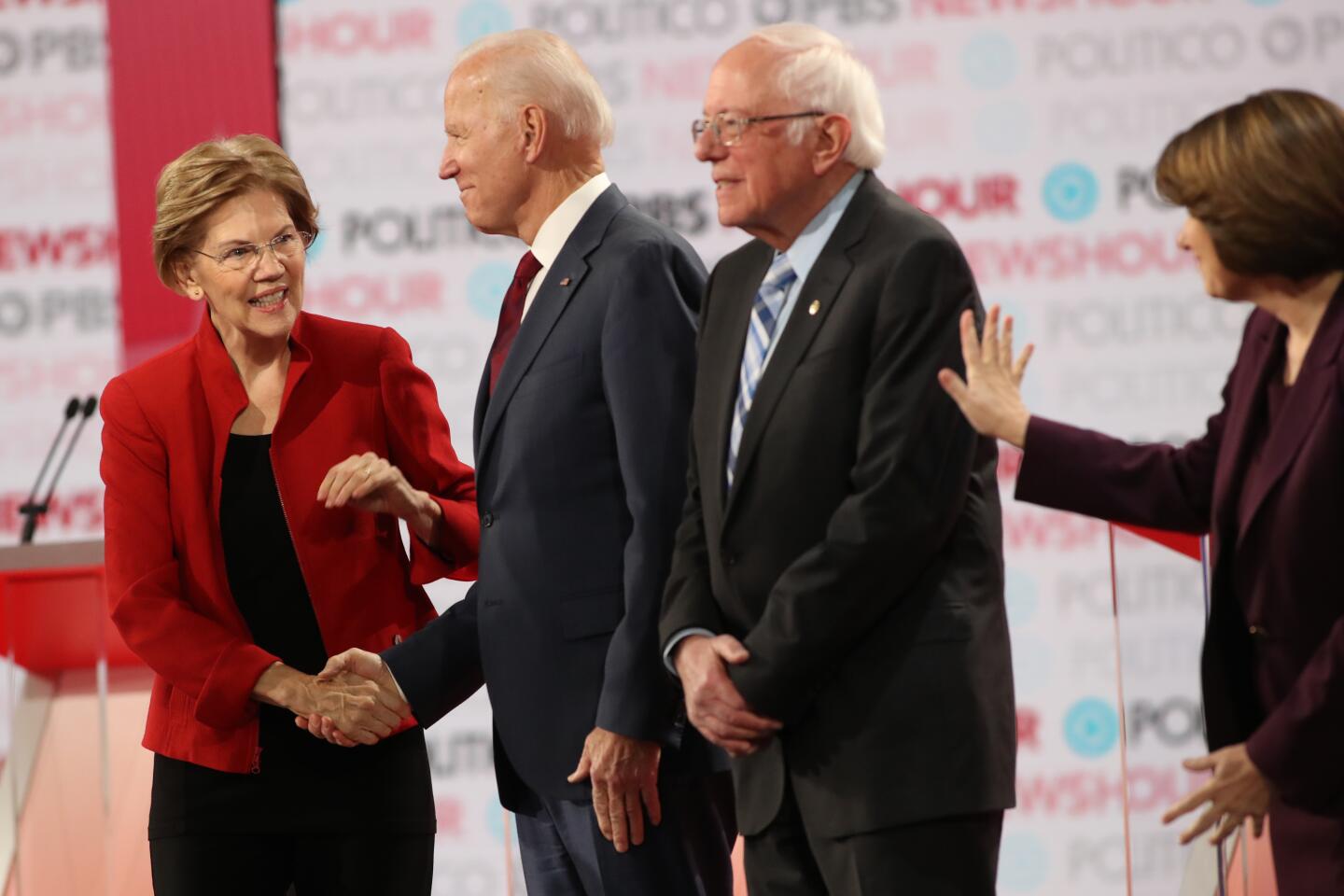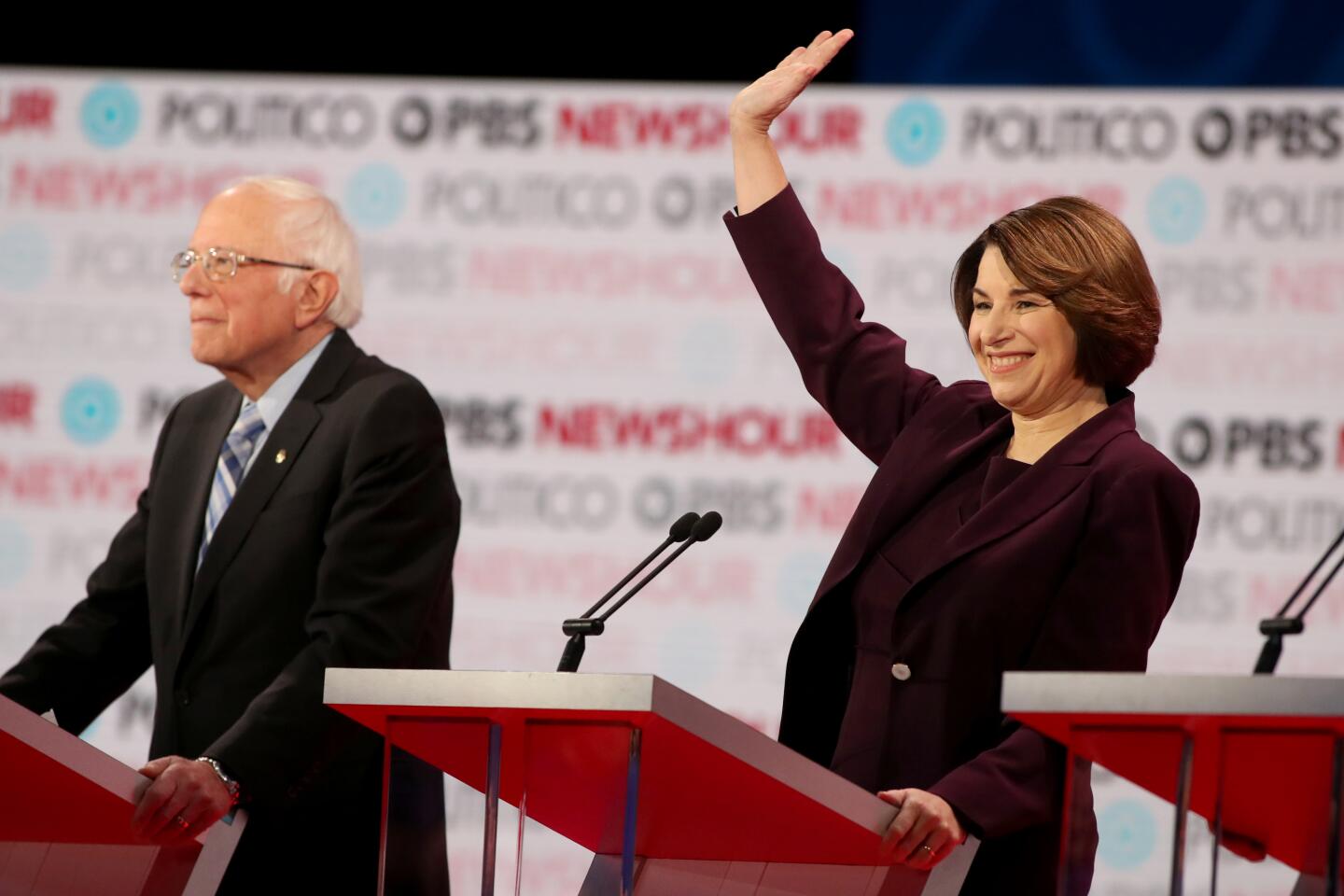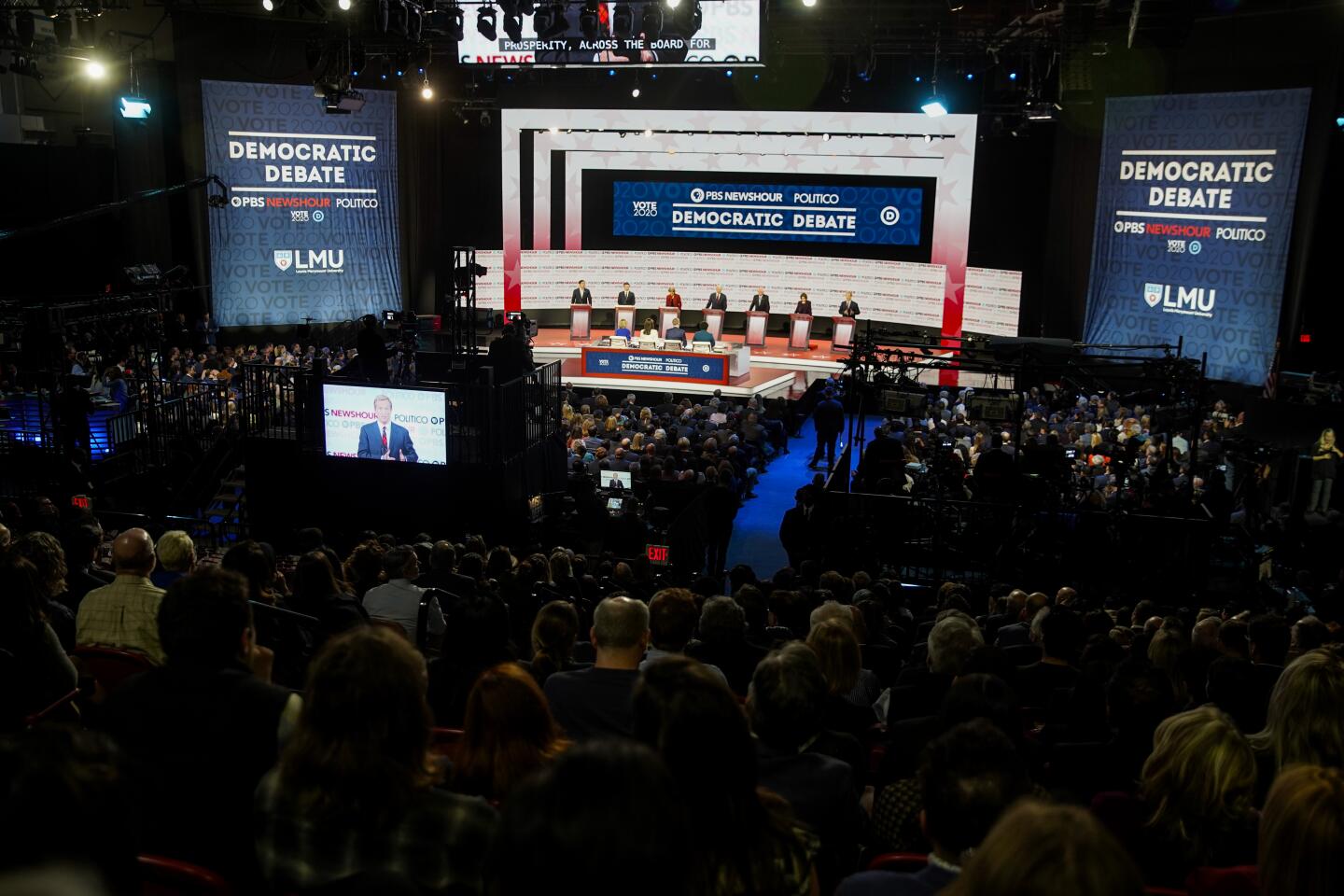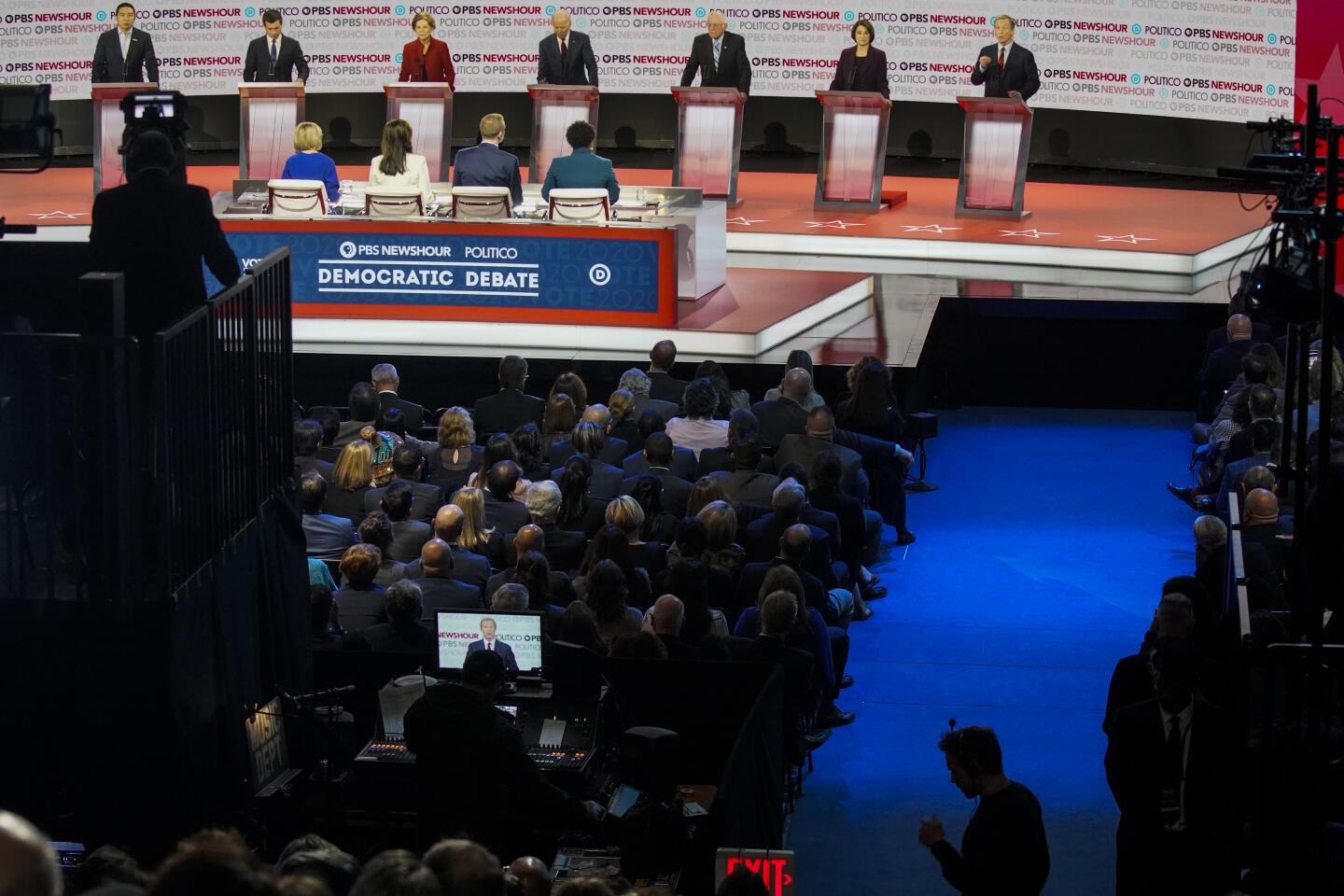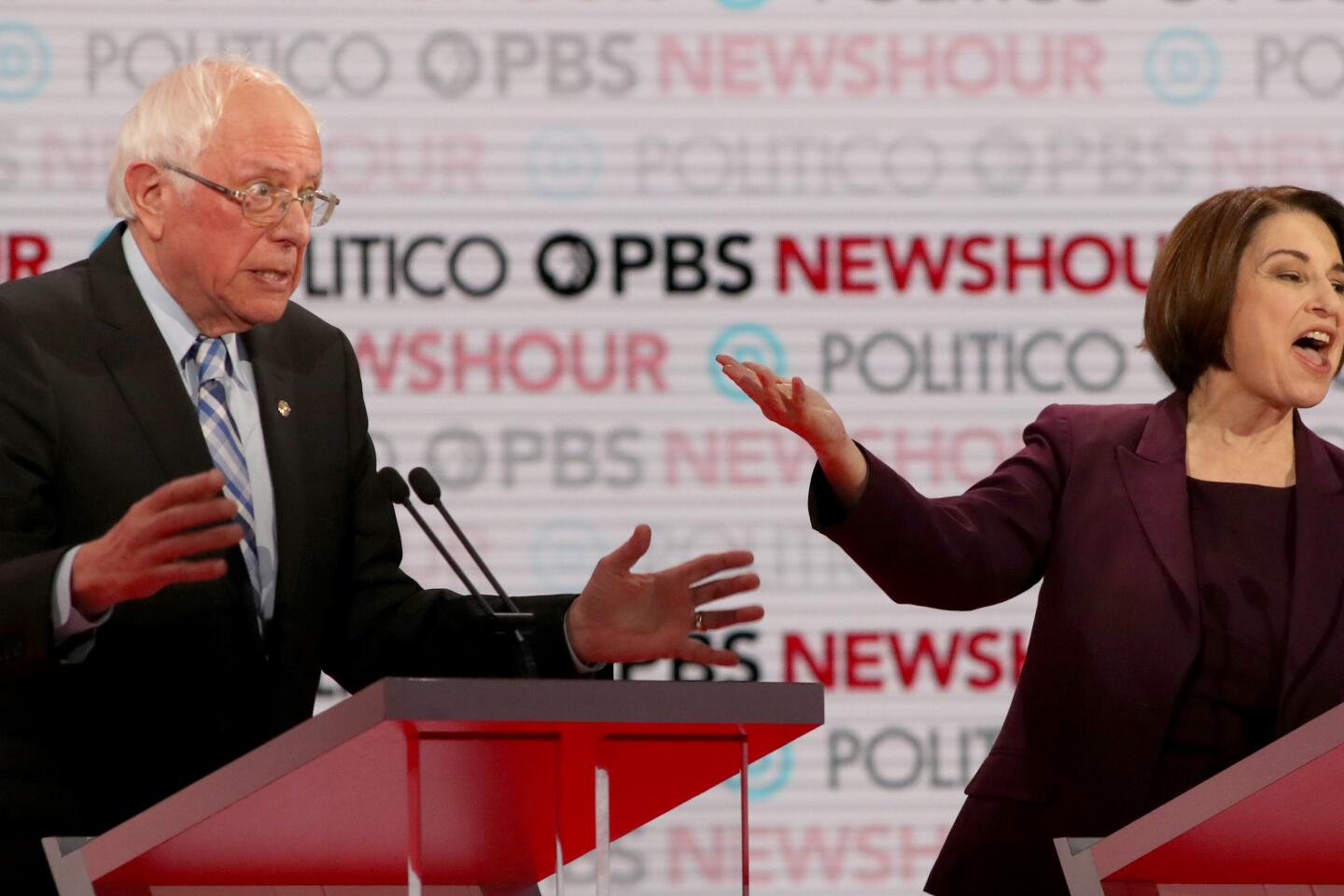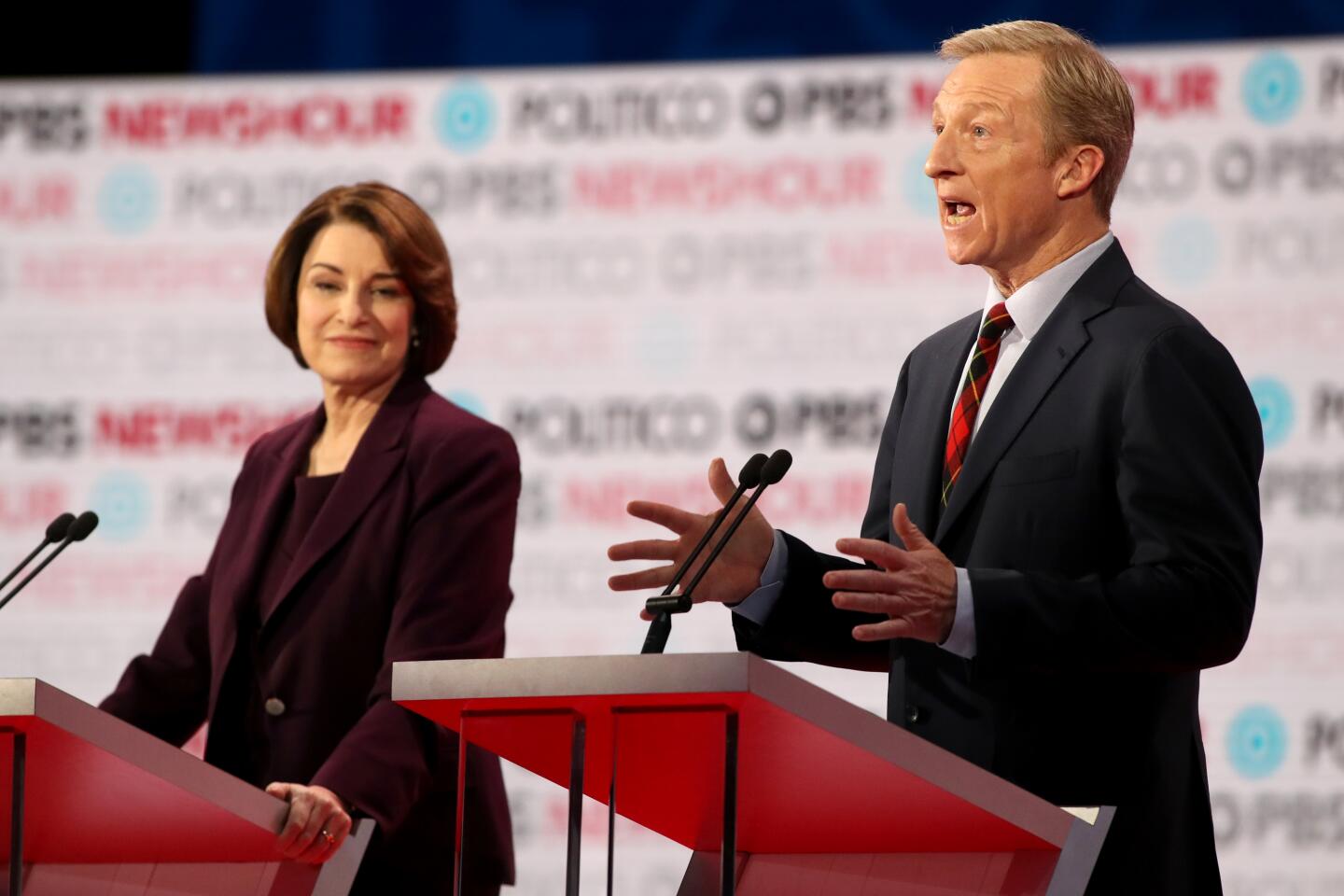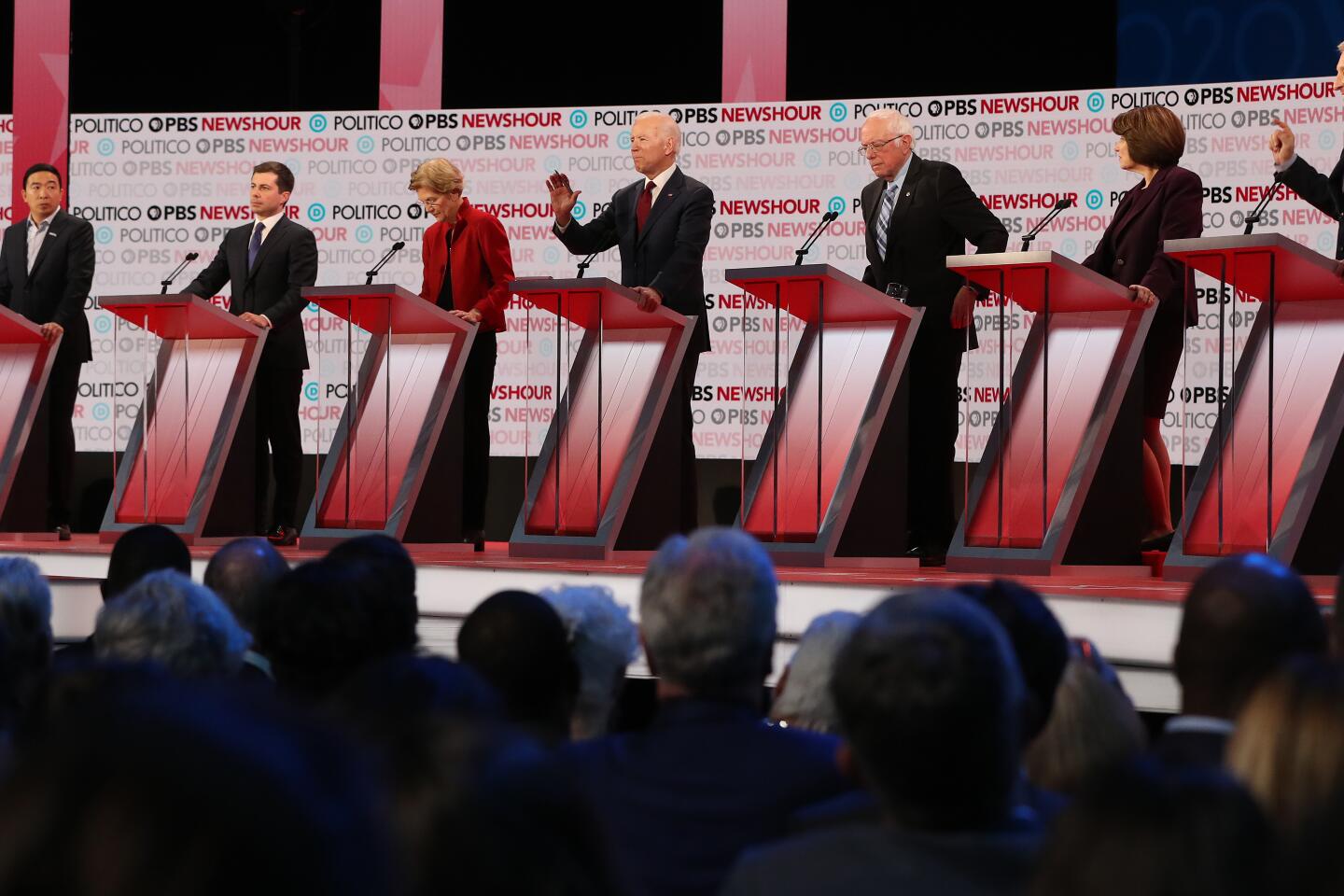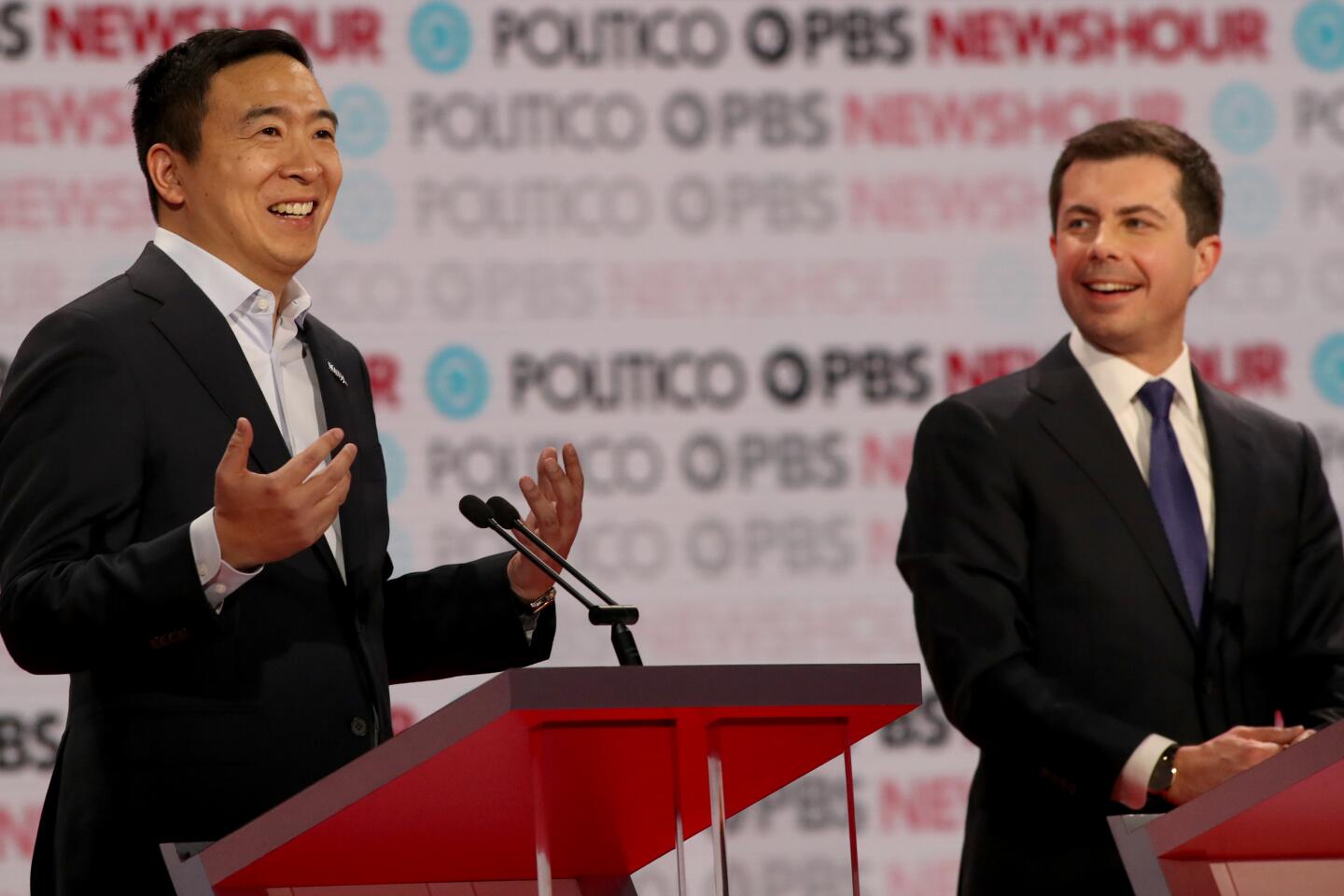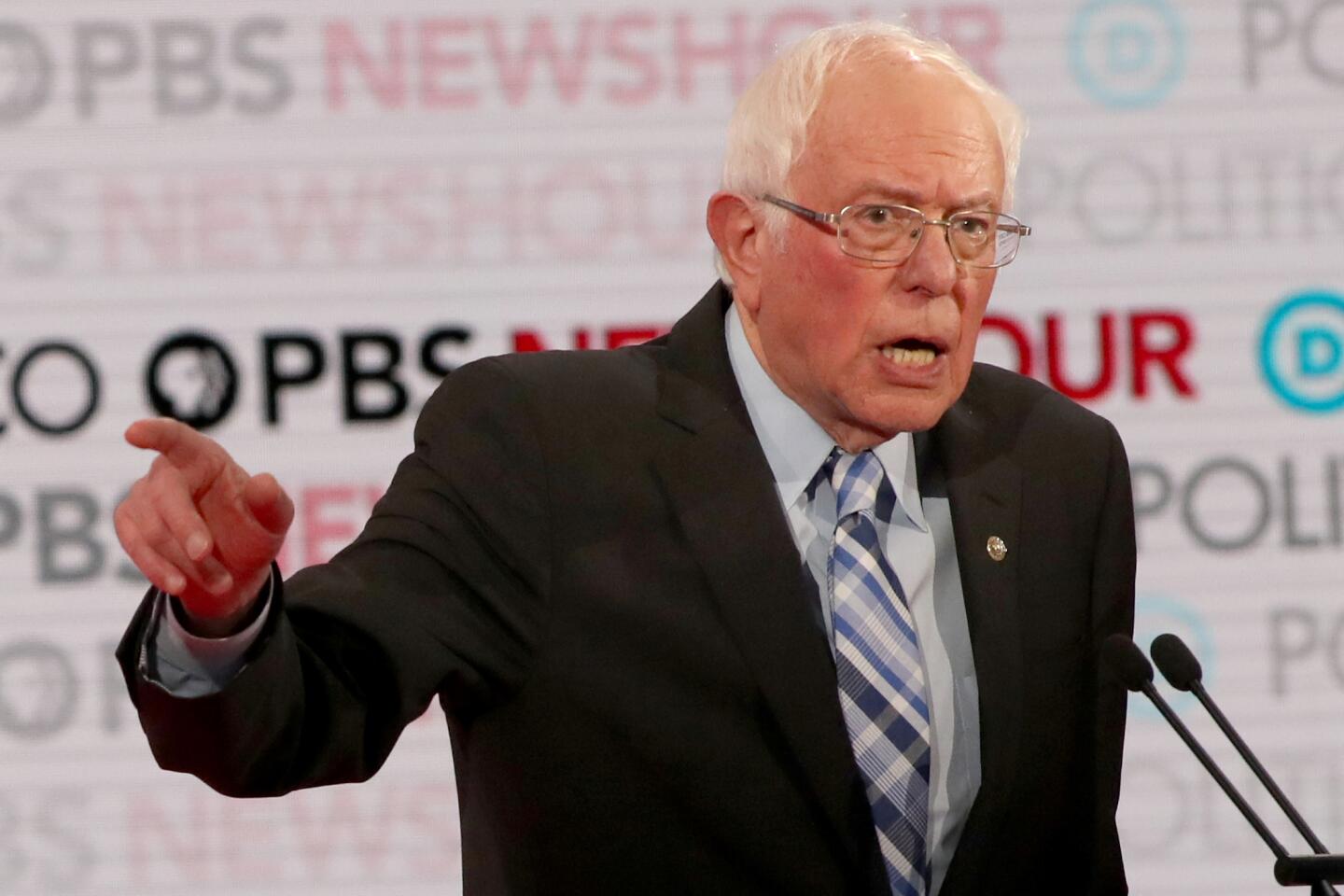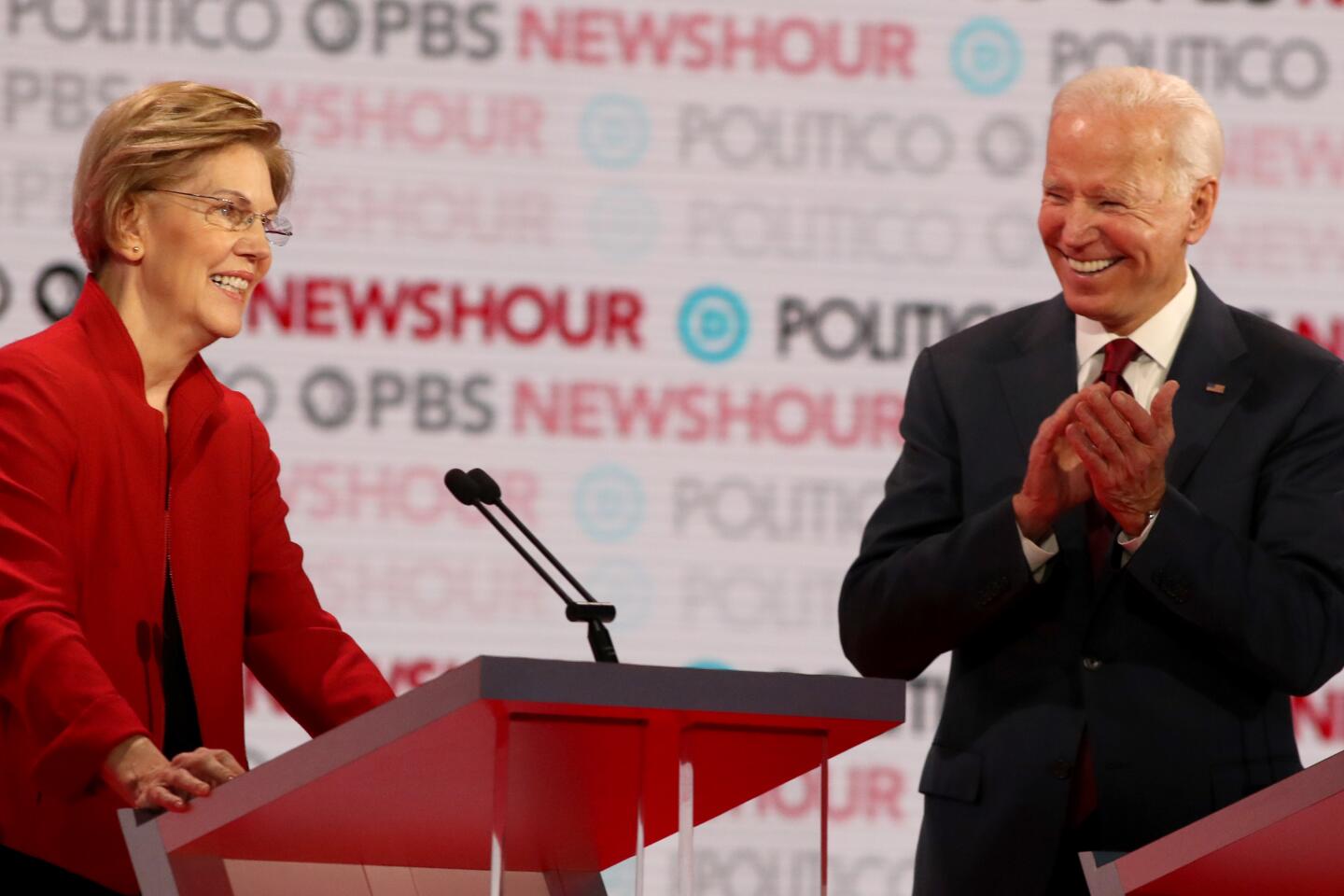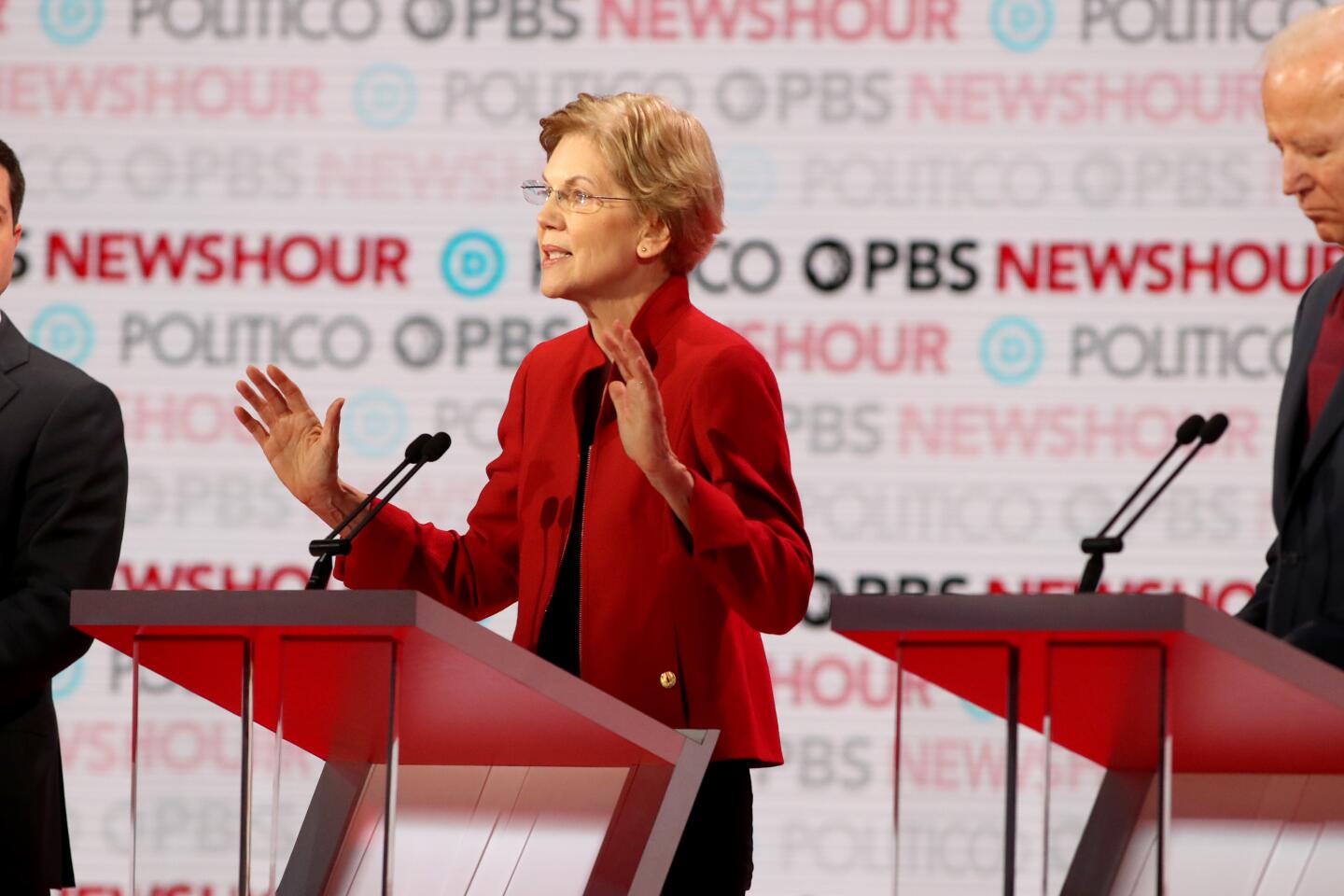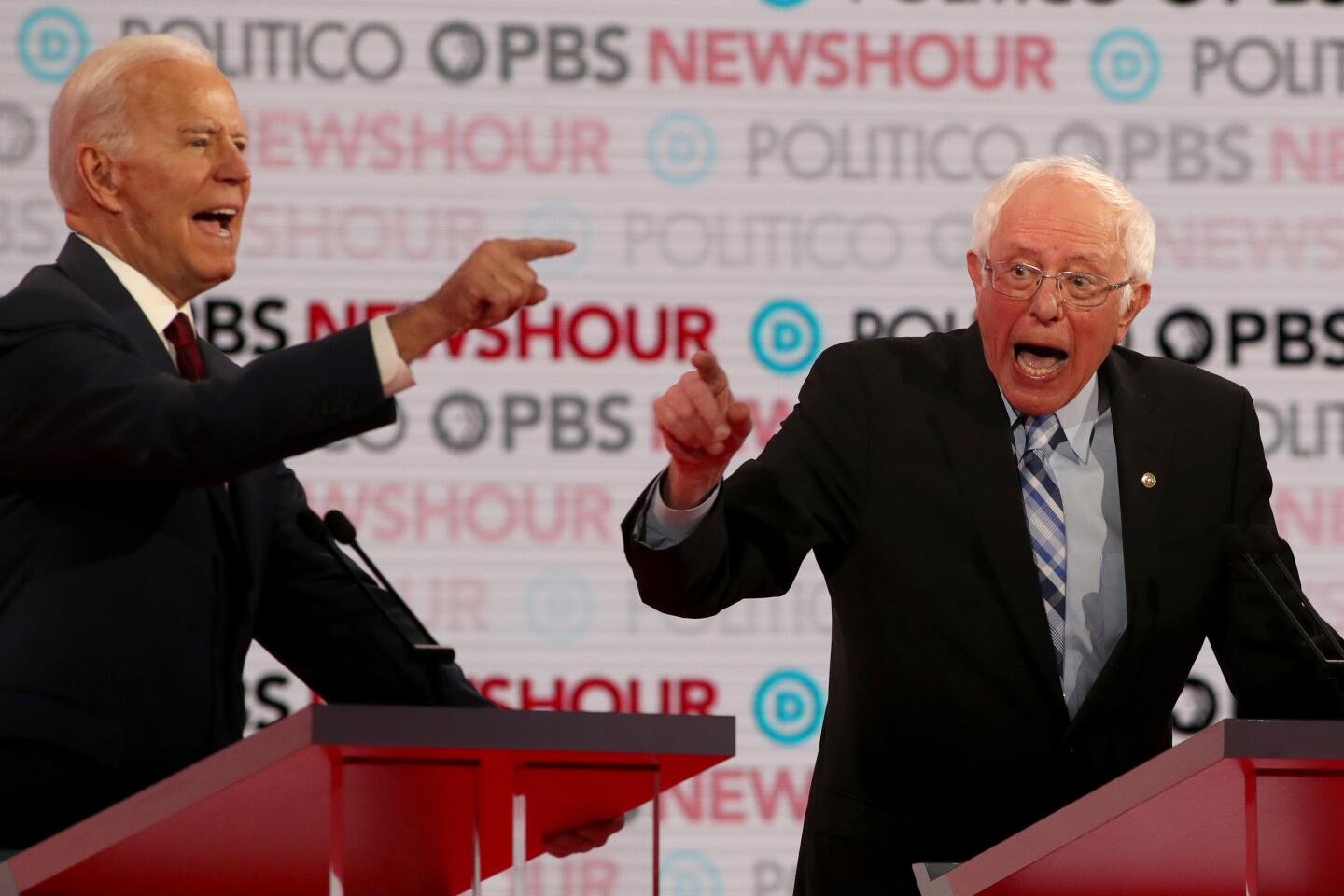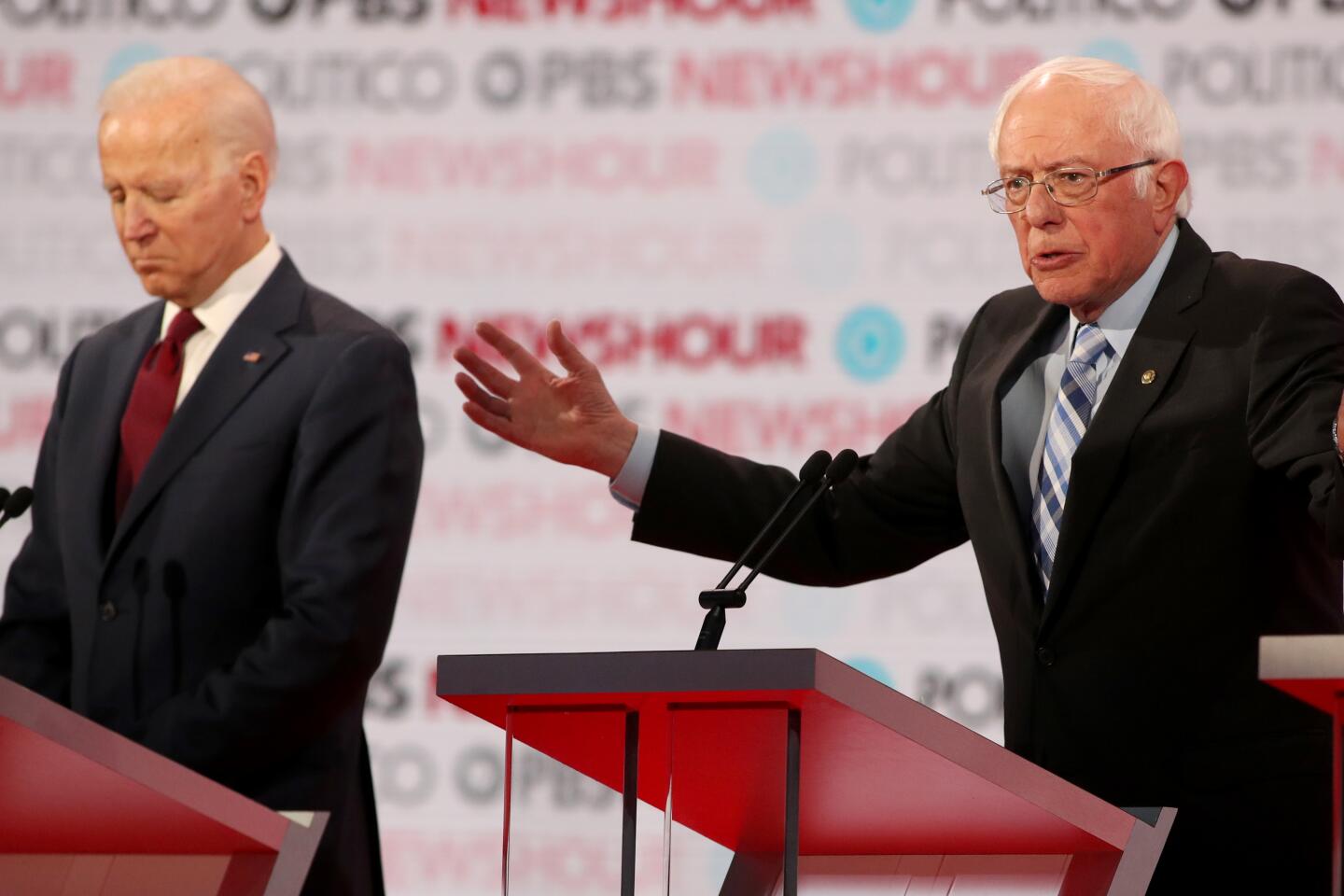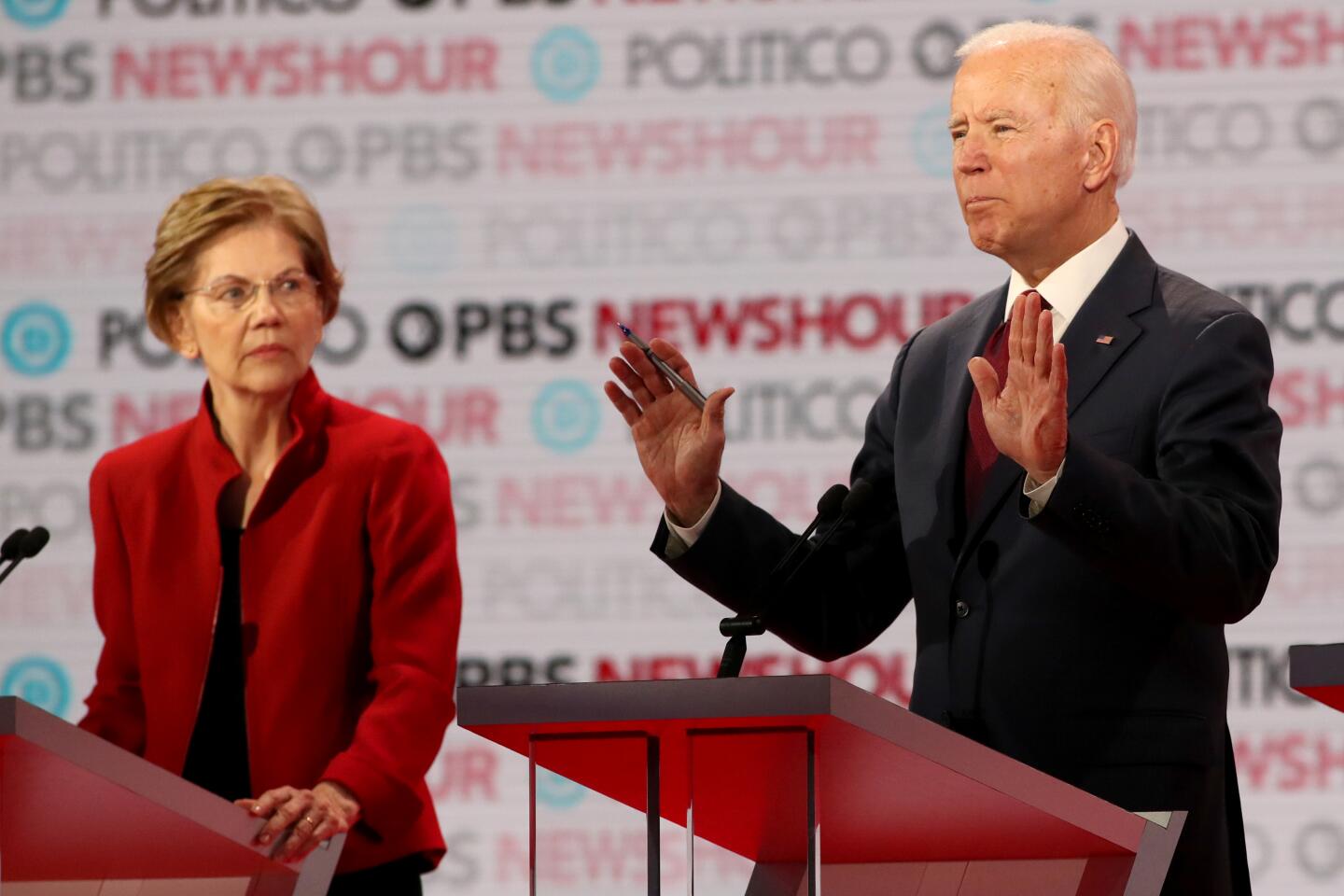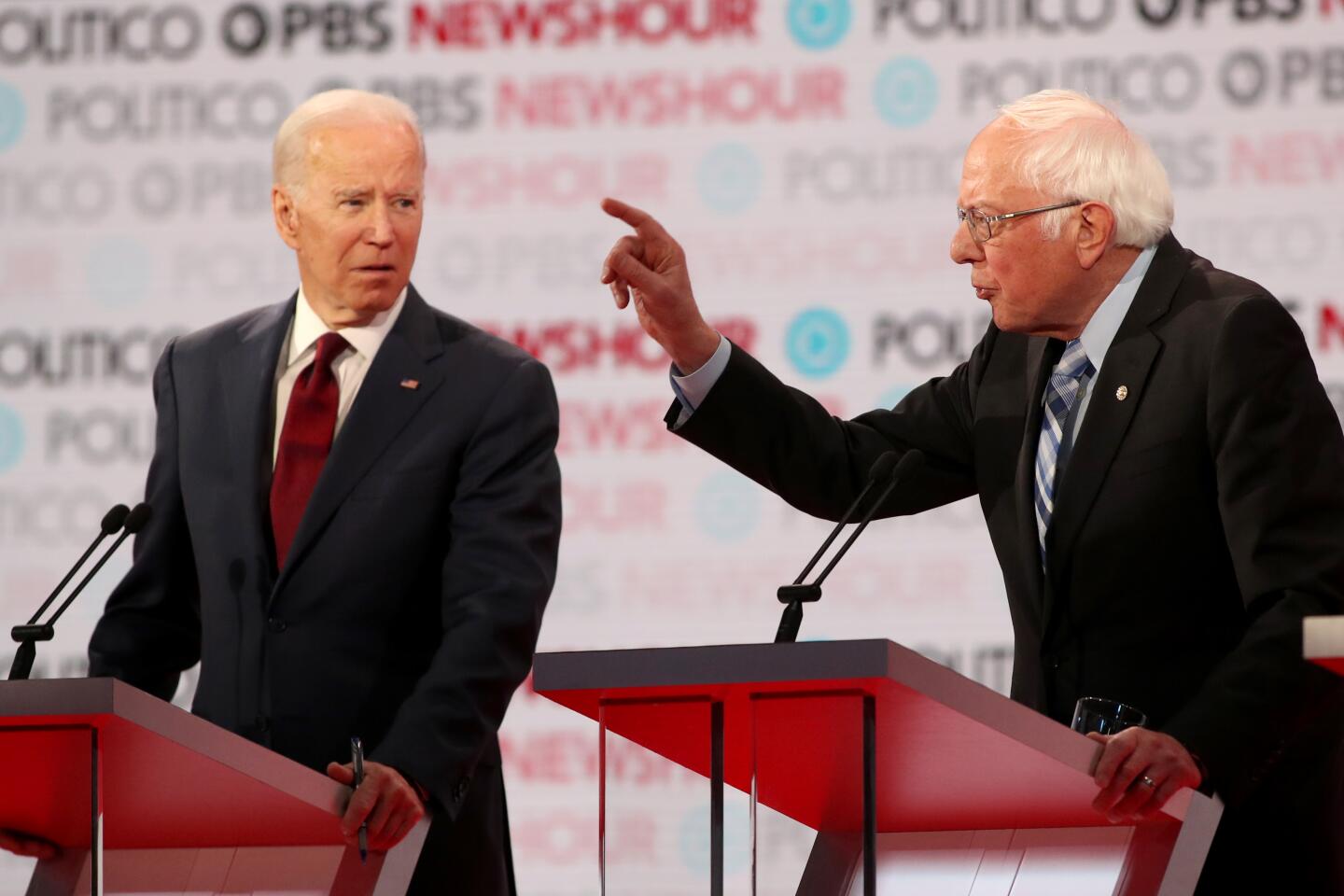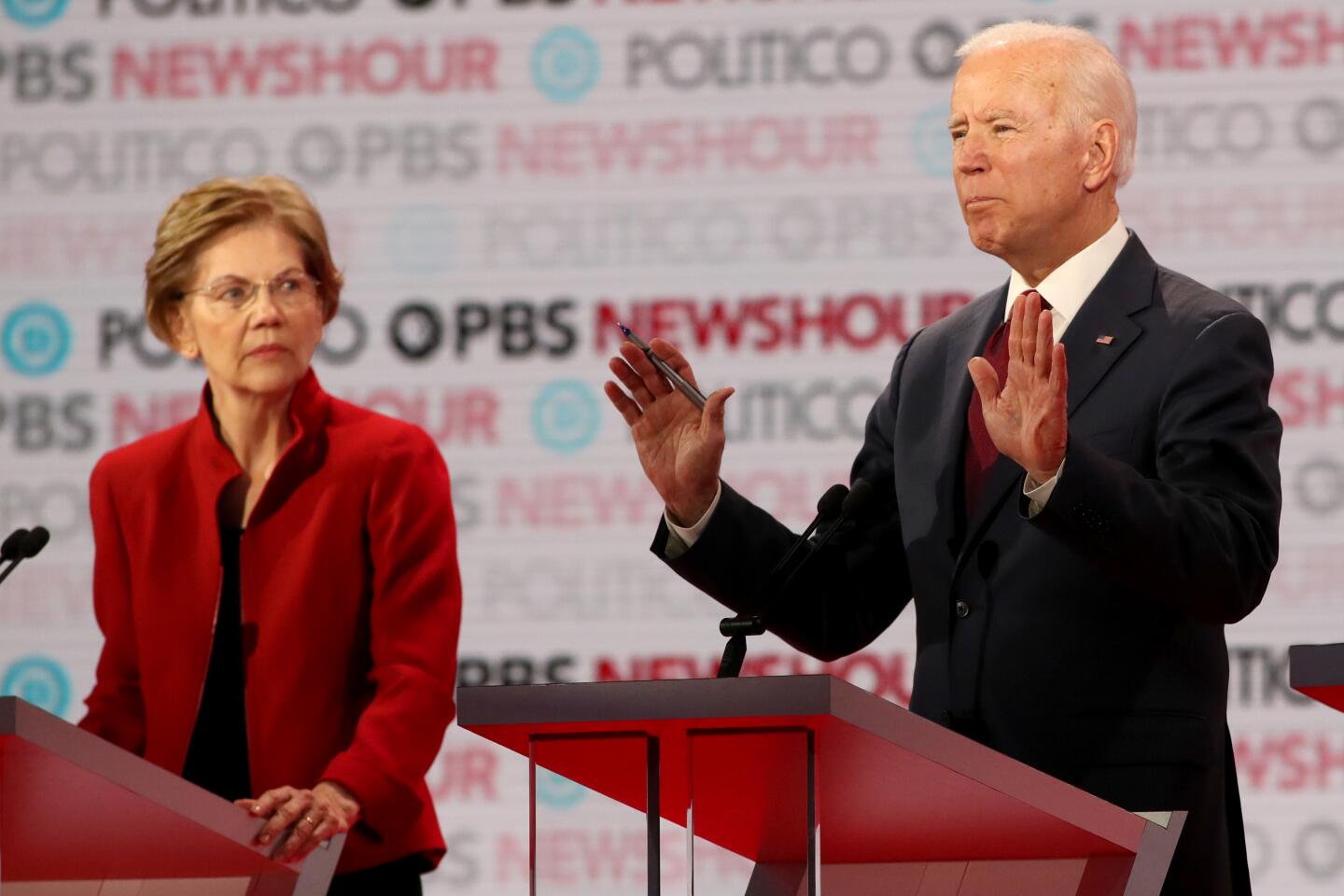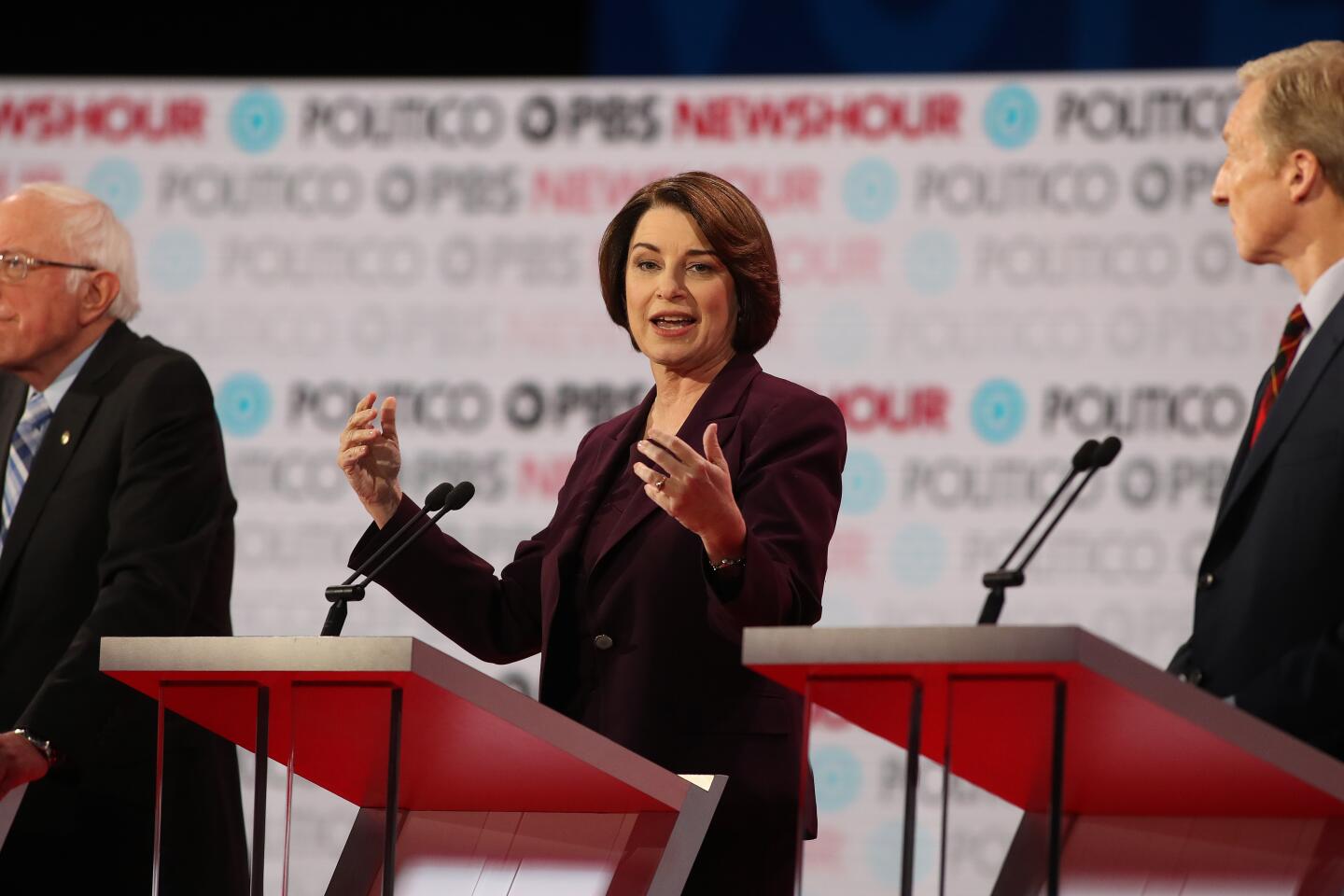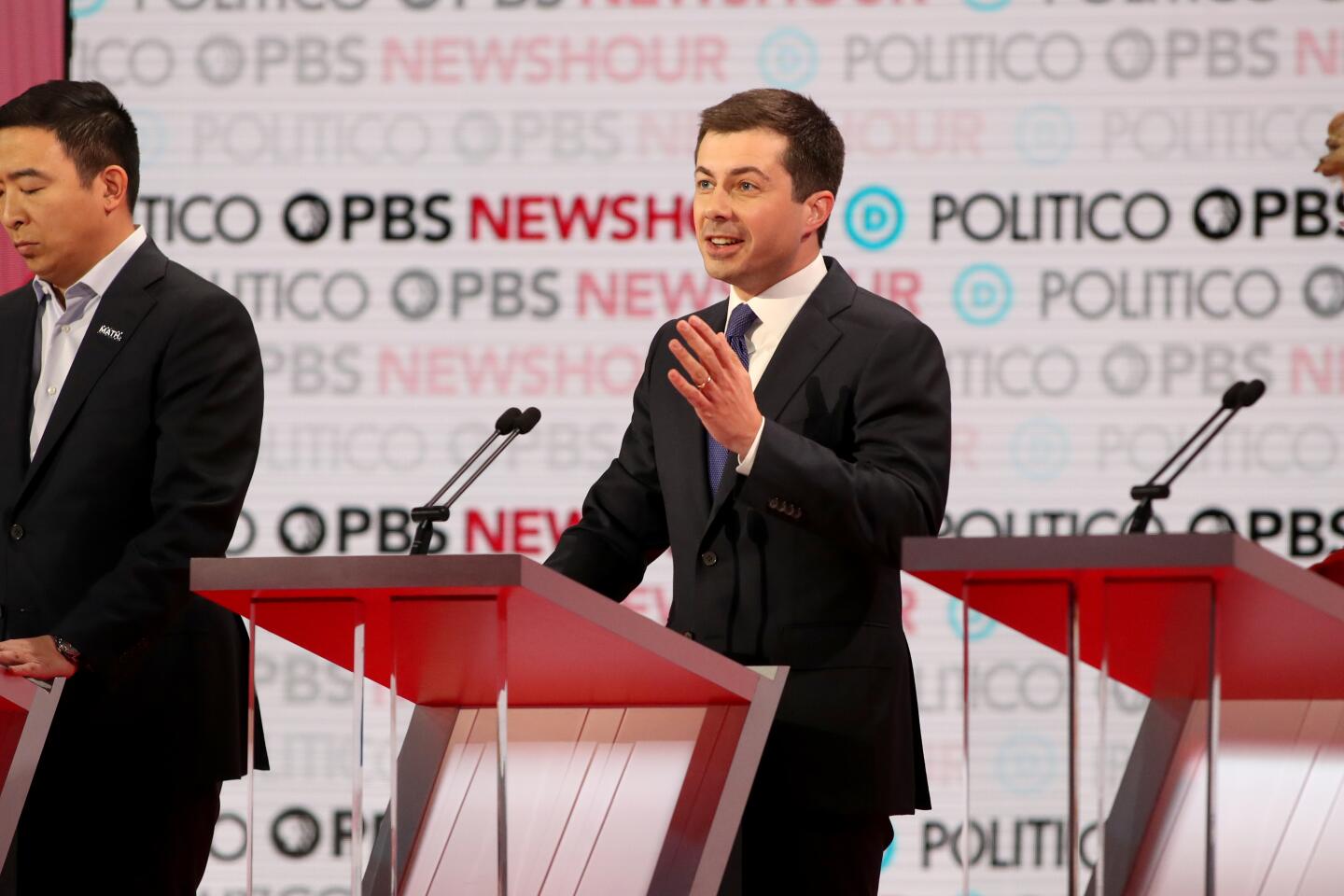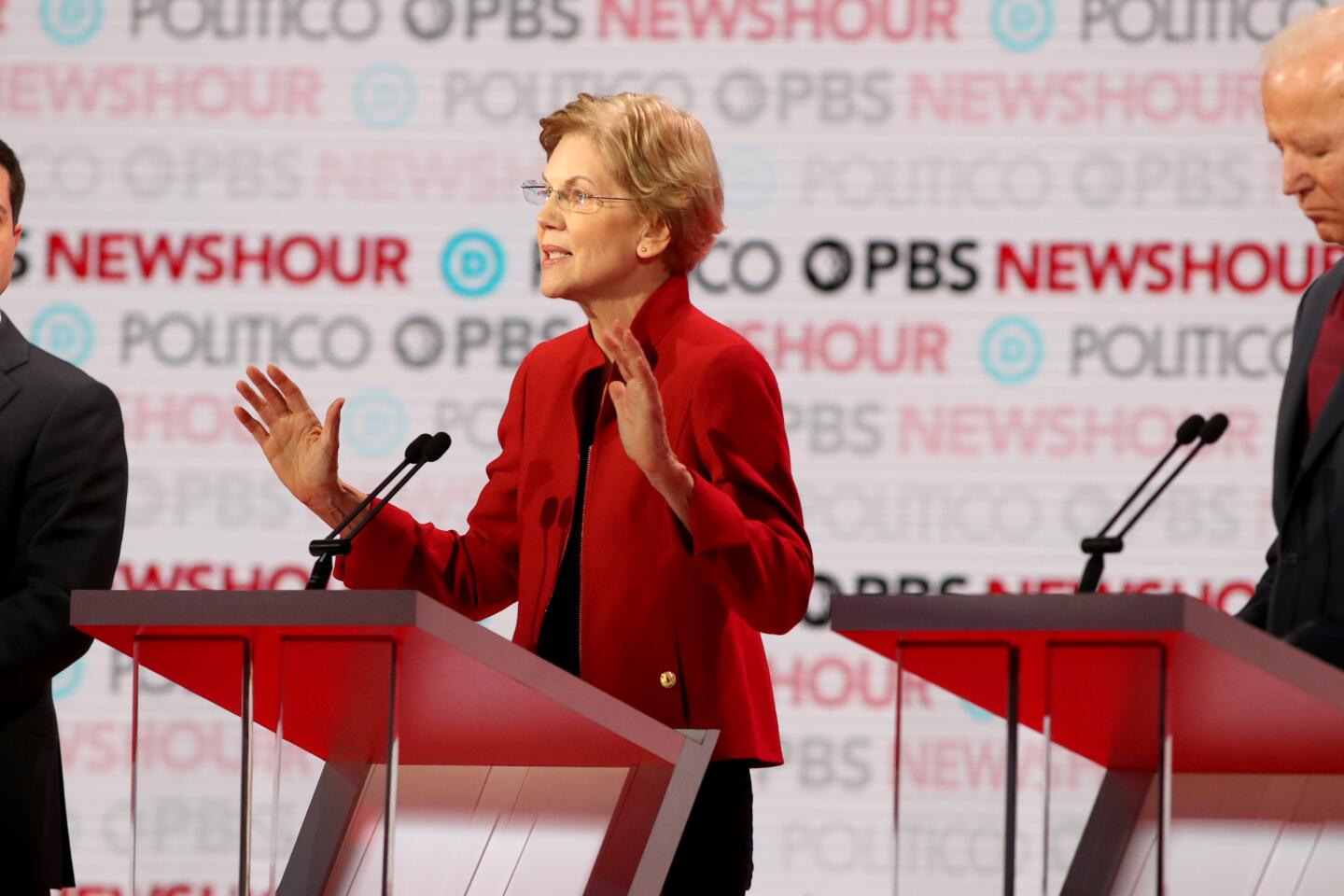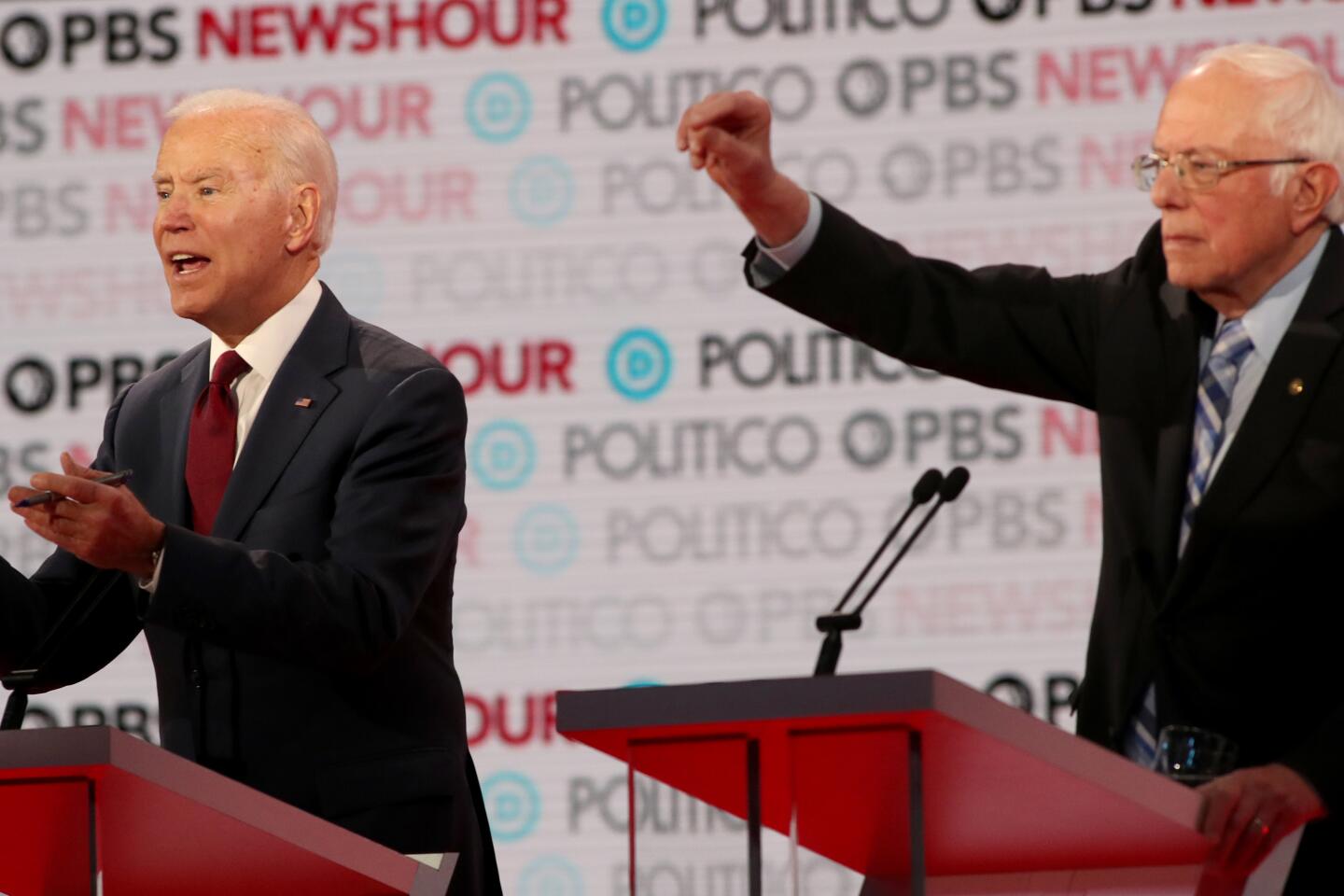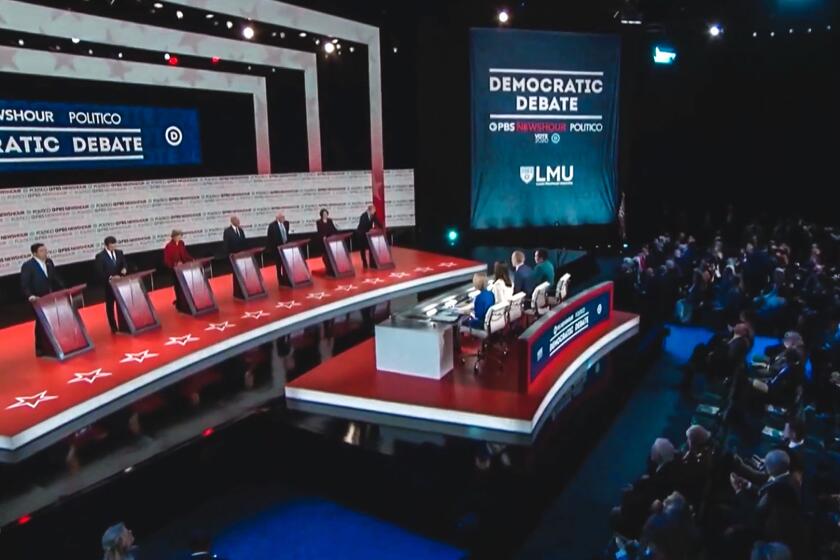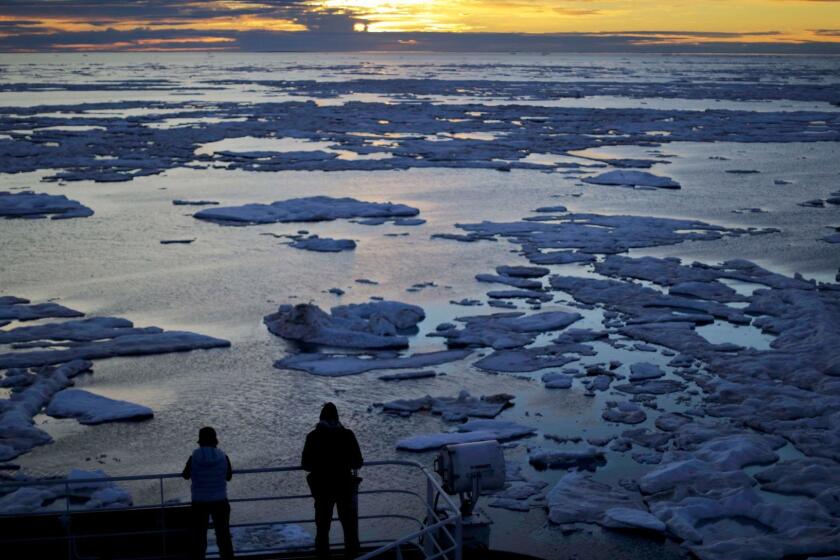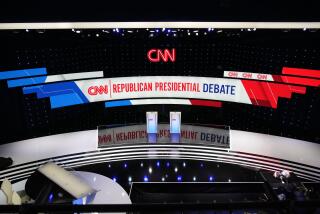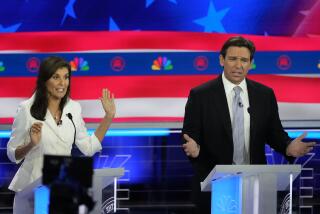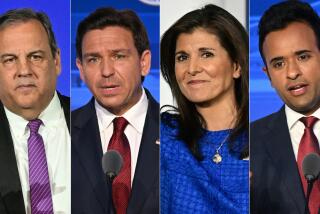Democratic debate brings long-simmering rivalries into the open
United in their disdain for President Trump, top Democratic presidential candidates aired their differences over healthcare, foreign policy and the influence of money in politics in a pugnacious year-end primary debate.
The battle lines reflected the current state of play in the race. Massachusetts Sen. Elizabeth Warren and Pete Buttigieg, the mayor of South Bend, Ind., continued their long-simmering rivalry, and Minnesota Sen. Amy Klobuchar resurfaced her critiques of the millennial mayor’s limited resume. The two most consistent front-runners of the race, former Vice President Joe Biden and Vermont Sen. Bernie Sanders, largely trained their sights on each other.
The final confab of 2019, hosted by “PBS NewsHour” and Politico, was the smallest yet; only seven candidates met the stricter polling and donor requirements set by the Democratic National Committee. The candidates squared off Thursday evening in Gersten Pavilion at Loyola Marymount University, a Jesuit university perched on a bluff overlooking Marina del Rey and the Pacific Ocean.
Seven of the party’s White House hopefuls laid aside notions of peace on Earth and good will toward man — and woman — to joust in the year’s sixth and final presidential debate.
A relatively sedate affair in its first hour, the debate took a more combative tone when Warren criticized the influence of wealthy donors, an implicit jab at Buttigieg, who has ascended in the polls in recent weeks.
“I can’t help but feel that might have been directed at me,” said Buttigieg, who went on to frame his fundraising strategy — reliant on both small-dollar grass-roots donors and wealthy givers — as a nod to inclusivity.
“I’m not going to turn away anyone who wants to help us defeat Donald Trump,” he said.
Warren responded with derision over Buttigieg’s recent fundraiser in a lavish wine cave in Napa Valley.
“We made the decision many years ago that rich people in smoke-filled rooms would not pick the president of the United States,” she said. “Billionaires in wine caves should not pick the president of the United States.”
Buttigieg, noting Warren herself partook in private fundraisers in the past, accused her of “issuing purity tests you cannot yourself pass.”
One of the sharpest attacks on Buttigieg didn’t come from his usual progressive foes, but from his fellow Midwestern moderate, Klobuchar.
Klobuchar raised questions about Buttigieg’s “electability,” noting that he lost his most recent race, in 2017, to become chair of the Democratic Party.
“If you want to talk about capacity to win, try putting together a coalition to bring you back to office with 80% of the vote as a gay dude in Mike Pence’s Indiana,” Buttigieg said of his 2015 reelection as mayor of South Bend, a Democratic stronghold — a distinction Klobuchar picked up on.
Seven of the party’s White House hopefuls laid aside notions of peace on Earth and good will toward man — and woman — to joust in the year’s sixth and final presidential debate.
“If you had won in Indiana, that would be one thing,” Klobuchar responded, referencing Buttigieg’s 2010 run for state treasurer. “You tried. You lost by 20 points.”
Meanwhile, Biden and Sanders reprised their squabble over their approach to healthcare policy, as Biden attacked Sanders over “Medicare for all,” calling Sanders’ plan to replace private insurance with government insurance “unrealistic.”
“Put your hand down for a second,” Biden teased Sanders, as the Vermont senator waved to the moderators to get a chance to respond.
“Joe’s plan” would “maintain the status quo,” Sanders said, rattling off details about how much American workers currently pay for private health insurance.
“I’m going to interrupt now,” Biden replied. “It’s going to cost $30 trillion over 10 years.” He called Sanders’ cost estimates “preposterous.” “At least before he was honest about it!”
The former vice president also found himself on the defensive on foreign policy when he was asked about recent disclosures in the Washington Post that multiple American administrations, including the Obama White House, in which Biden served, misled the public about the Afghanistan war.
“I’m the guy who from the beginning argued that it was a big, big mistake to surge forces to Afghanistan, period,” said Biden, distancing himself from President Obama’s decision. “We should not have done it, and I argued against it constantly.”
Sanders quickly lobbed a salvo about Biden’s foreign policy judgment.
“You’re also the guy who helped lead us to the disastrous war in Iraq,” he said, noting Biden’s vote for the Iraq war when he was a senator.
Just one day after President Trump became the third American president to be impeached by the House of Representatives, the historic event merited roughly 10 minutes of the three-hour forum. As the candidates explained how they would convince a deeply divided public that Trump deserved such severe reproach, they largely relied on well-established campaign themes.
Biden, who has touted his foreign policy credentials as a central selling point, lamented the decline of America’s reputation abroad. “We need to restore the integrity of the presidency,” he said.
For Warren, it was a chance for return to her anti-corruption mantra.
“We need a candidate for president who can draw the sharpest distinction between the corruption of the Trump administration and a Democrat who is willing to get out and fight, not for the wealthy and well-connected but to fight for everyone else,” Warren said. “That’s why I’m in this race.”
Andrew Yang, the New York-based entrepreneur, chided the media and Democrats for focusing too much on the president and not enough on the decline in manufacturing jobs in states that propelled Trump to the White House.
“We have to stop being obsessed over impeachment ... and actually start digging in and solving the problems that got Donald Trump elected in the first place,” he said.
Candidates were united in painting a dire view of the national economy, arguing that rosy statistics on the country’s gross domestic product and low unemployment rate have not translated to average Americans’ bank accounts.
“People are not getting paid enough,” Buttigieg said. “That is not the result of some mysterious cosmic force. It’s the result of bad policy.”
Californian Tom Steyer, the billionaire activist and former hedge fund chief, argued his success in the private sector would blunt Trump’s plan to run on the health of the economy.
“My experience building a business, understanding how to make that happen, means I can go toe-to-toe with Mr. Trump and take him down on the economy and expose him as a fraud and a failure,” Steyer said.
There was less unanimity on the new proposed North American trade agreement, known as USMCA, which was passed Thursday by the House.
Sanders said he liked that the new proposal would give Mexican workers more protection for forming independent labor unions that might help secure higher wages. But, he said, “it is not going to stop outsourcing, it is not going to stop corporations from moving to Mexico,” and that’s why he’s decided to vote against it when it arrives in the Senate.
Klobuchar, by contrast, said that while some of Sanders’ concerns were “correct,” she plans to vote for the measure, because it has “better labor standards, better environmental standards” and represents “a much better deal” than the North American Free Trade Agreement.
The candidates seemed to relish the Southern California setting — building in extra time in their visits to raise money and host campaign rallies — but there was no mention onstage of housing or homelessness, two issues at the front of mind of many Golden State voters.
Another top concern for California voters, climate change, did get substantial attention from the candidates, as Klobuchar acknowledged the devastating wildfires in Paradise and elsewhere in the state that have worsened as the planet warms. Buttigieg spoke of the on-the-ground effects of climate change closer to his home.
The presidential candidates in the December Democratic debate all have robust climate action agendas. The differences lie in how far, how fast and how much to spend.
“This is not theoretical,” he said, referencing his neighborhood in South Bend that recently faced two thousand-year floods.
Sanders warned that scientists have underestimated the threat of climate change. But in a moment symbolizing the Democrats’ struggle to prioritize the issue, when the questions turned to race, Sanders tried to wrest the subject back to climate change, drawing a rebuke from moderator Amna Nawaz, senior national correspondent on “NewsHour.”
“Senator, this question is about race,” Nawaz said, drawing large cheers from the audience.
“People of color are going to be the people suffering most if we do not deal with climate change,” Sanders responded.
Yang, the only candidate of color to qualify for the debate, bemoaned the absence of diversity on the debate stage.
“It’s both an honor and disappointment to be the lone candidate of color onstage tonight. I miss Kamala, I miss Cory,” Yang said, in a nod to California Sen. Kamala Harris, who dropped out of the race this month, and New Jersey Sen. Cory Booker, who did not qualify.
“Though I think Cory will be back,” he added.
The topic of identity — be it race, gender or age — yielded some of the clumsier exchanges of the night. When Politico senior correspondent Tim Alberta noted that former President Obama argued for more female leaders of countries and attributed problems to “old men not getting out of the way,” he immediately turned to Sanders, whom he identified as the oldest contender onstage.
“And I’m white as well, yes,” Sanders said.
Biden, meanwhile, brushed off the potential of a slight from his former running mate.
“I’m going to guess he wasn’t talking about me either,” Biden said.
Warren, meanwhile, more successfully landed a zinger when it was noted that if elected, she would be the oldest president ever to be sworn in.
“I’d also be the youngest woman ever inaugurated,” she countered.
More to Read
Get the L.A. Times Politics newsletter
Deeply reported insights into legislation, politics and policy from Sacramento, Washington and beyond. In your inbox three times per week.
You may occasionally receive promotional content from the Los Angeles Times.
